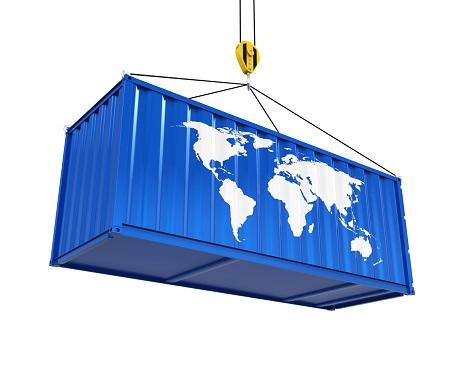President and CEO
- FMA
- The Fabricator
- FABTECH
- Canadian Metalworking
Categories
- Additive Manufacturing
- Aluminum Welding
- Arc Welding
- Assembly and Joining
- Automation and Robotics
- Bending and Forming
- Consumables
- Cutting and Weld Prep
- Electric Vehicles
- En Español
- Finishing
- Hydroforming
- Laser Cutting
- Laser Welding
- Machining
- Manufacturing Software
- Materials Handling
- Metals/Materials
- Oxyfuel Cutting
- Plasma Cutting
- Power Tools
- Punching and Other Holemaking
- Roll Forming
- Safety
- Sawing
- Shearing
- Shop Management
- Testing and Measuring
- Tube and Pipe Fabrication
- Tube and Pipe Production
- Waterjet Cutting
Industry Directory
Webcasts
Podcasts
FAB 40
Advertise
Subscribe
Account Login
Search
Take a stand for free and fair trade
A move to boost national security may put the domestic metal fabricating base at risk
- By Ed Youdell
- July 13, 2017

A ruling that aims to protect the domestic steel industry could set off a chain reaction that could result in harm to the U.S. metal fabricating industry.
Dear Metal Fabrication Industry Professional,
Under the authority of the 1962 Trade Expansion Act, Section 232, President Donald Trump’s administration is currently taking a look at whether the importing of steel is hurting the domestic steel industry to the point where national security may be at risk. The outcome of this investigation and the potential of tightening the steel supply chain with resulting trade barriers have the potential to harm the future health and competitiveness of the U.S. metal fabrication sector.
Protecting the 149,000 people who work in the steel industry sounds prudent on the surface, but not if it comes at the expense of many more jobs in the U.S. metal fabricating industry. For instance, the National Institute of Standards and Technology believes that 1.4 million people are employed by companies identified as “fabricated metal products manufacturers.” (That’s North American Industry Classification System 332, to be exact.) If steps are taken to protect domestic steel industry jobs while putting several thousand more at risk, then nothing will be accomplished.
In today’s globally competitive environment, it is an unfortunate reality that some foreign countries, as well as individual companies, seek to circumvent U.S. trade laws when importing into the U.S. Enforcement against those who violate our laws must be approached with care, as the unintended result will most certainly be higher material costs for metal fabricators. This also is happening at a time when the U.S. dollar’s value is high, making U.S. exports more expensive around the globe. Metal fabricators that sell goods to other countries and that are in supply chains where the end product is exported don’t have the ability to absorb huge steel price increases because market dynamics simply don’t allow those increases to be passed along to their foreign customers.
As the U.S. steel industry rushes to ramp up production to fill the supply gap that is sure to result from any trade penalties placed on foreign steelmakers, metal fabricators are sure to face shortages and allocations as they look to fill orders. The increased demand in the face of limited supply will cause prices to increase further.
Finally, any sanctions leveled against foreign steel producers that do not go far enough in their scope could lead to a flood of imported fabricated parts as foreign competitors look to circumvent paying duties on foreign steel. Over the past several years, the U.S. metal fabricating base has stepped up in its battle against global competitors, which benefit from cheap labor forces and lax governmental regulations, but it can’t sustain further assaults that may arise as foreign countries look to bypass trade penalties related to steel. This is the worst possible scenario that I can imagine. This realistically will lead to hundreds of job losses and reduced operating capacity for U.S. metal fabricators. What will have been gained by protecting the U.S. steel industry if its domestic customer base shrinks in the process?
We know that metal parts are being competitively fabricated in the U.S. today, and with your support, we want to ensure that a level playing field remains in place for domestic metal fabricators. History shows us that free and fair trade is the foundation of our country’s manufacturing might and represents the best path forward for greater prosperity for all U.S. citizens.
I urge you to make your voice heard to President Trump, Commerce Secretary Wilbur Ross, and U.S. Trade Representative Robert Lighthizer.
President Trump can be reached at: The White House, 1600 Pennsylvania Ave. NW, Washington, DC 20500, Phone: 202-456-1111,Website: www.whitehouse.gov/contact/
Ross can be reached at: U.S. Department of Commerce, 1401 Constitution Ave. NW, Washington, DC 20230, Phone: 202-482-2000
Lighthizer can be reached at: Office of the United States Trade Representative, 600 17th St. NW, Washington, DC 20508, Phone - Trade & Development: 202-395-2839, Email: correspondence@ustr.eop.gov
Sincerely
Edward Youdell
President and CEO
Fabricators and Manufacturers Association, International
subscribe now

The Fabricator is North America's leading magazine for the metal forming and fabricating industry. The magazine delivers the news, technical articles, and case histories that enable fabricators to do their jobs more efficiently. The Fabricator has served the industry since 1970.
start your free subscriptionAbout the Author

Ed Youdell
2135 Point Blvd
Elgin, IL 60123
888-394-7702
- Stay connected from anywhere

Easily access valuable industry resources now with full access to the digital edition of The Fabricator.

Easily access valuable industry resources now with full access to the digital edition of The Welder.

Easily access valuable industry resources now with full access to the digital edition of The Tube and Pipe Journal.
- Podcasting
- Podcast:
- The Fabricator Podcast
- Published:
- 04/16/2024
- Running Time:
- 63:29
In this episode of The Fabricator Podcast, Caleb Chamberlain, co-founder and CEO of OSH Cut, discusses his company’s...
- Trending Articles
Steel industry reacts to Nucor’s new weekly published HRC price

How to set a press brake backgauge manually

Capturing, recording equipment inspection data for FMEA

Are two heads better than one in fiber laser cutting?

Hypertherm Associates implements Rapyuta Robotics AMRs in warehouse

- Industry Events
16th Annual Safety Conference
- April 30 - May 1, 2024
- Elgin,
Pipe and Tube Conference
- May 21 - 22, 2024
- Omaha, NE
World-Class Roll Forming Workshop
- June 5 - 6, 2024
- Louisville, KY
Advanced Laser Application Workshop
- June 25 - 27, 2024
- Novi, MI


























